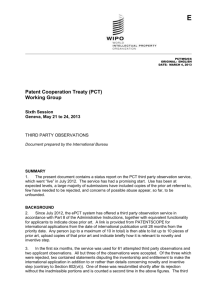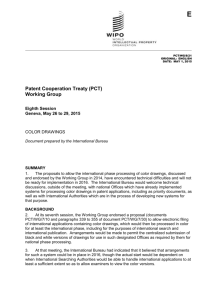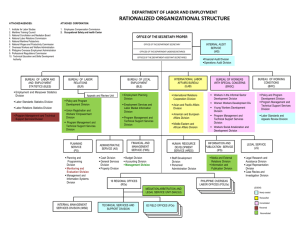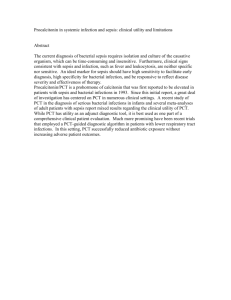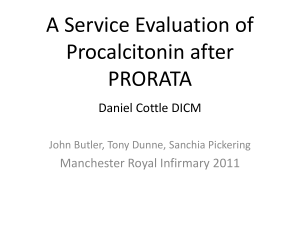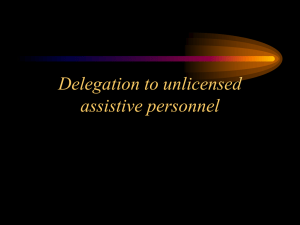Discussion of Responses to Circular C. PCT 1433
advertisement
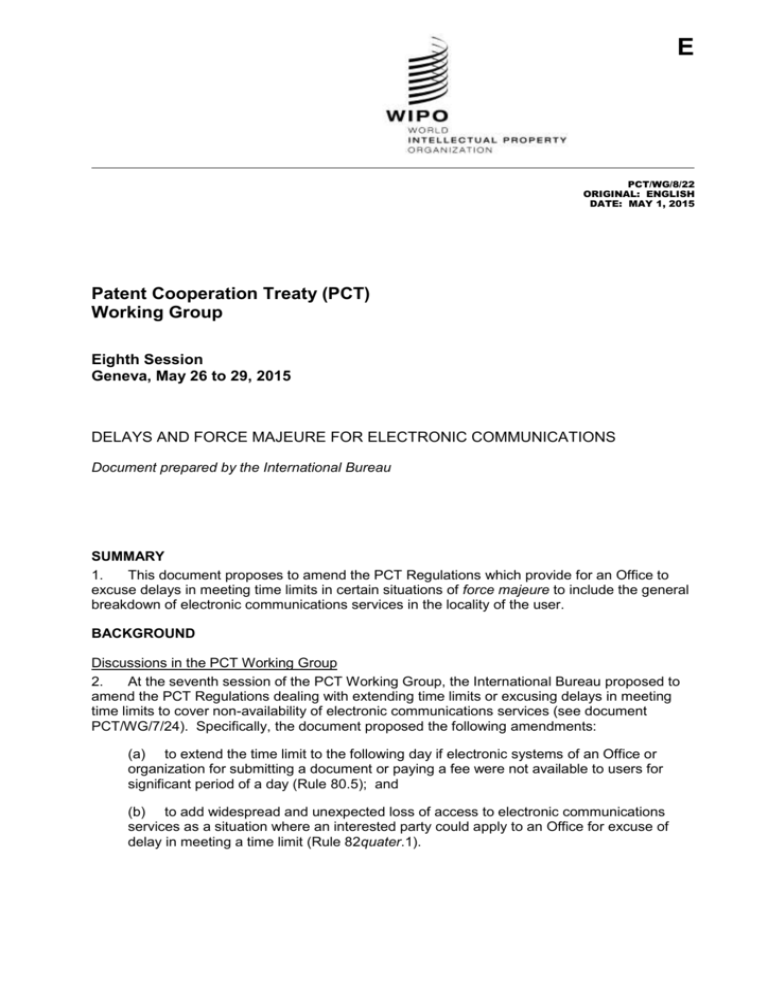
E PCT/WG/8/22 ORIGINAL: ENGLISH DATE: MAY 1, 2015 Patent Cooperation Treaty (PCT) Working Group Eighth Session Geneva, May 26 to 29, 2015 DELAYS AND FORCE MAJEURE FOR ELECTRONIC COMMUNICATIONS Document prepared by the International Bureau SUMMARY 1. This document proposes to amend the PCT Regulations which provide for an Office to excuse delays in meeting time limits in certain situations of force majeure to include the general breakdown of electronic communications services in the locality of the user. BACKGROUND Discussions in the PCT Working Group 2. At the seventh session of the PCT Working Group, the International Bureau proposed to amend the PCT Regulations dealing with extending time limits or excusing delays in meeting time limits to cover non-availability of electronic communications services (see document PCT/WG/7/24). Specifically, the document proposed the following amendments: (a) to extend the time limit to the following day if electronic systems of an Office or organization for submitting a document or paying a fee were not available to users for significant period of a day (Rule 80.5); and (b) to add widespread and unexpected loss of access to electronic communications services as a situation where an interested party could apply to an Office for excuse of delay in meeting a time limit (Rule 82quater.1). PCT/WG/8/22 page 2 3. Discussions of the proposed amendments are summarized in paragraphs 99 to 103 of the Summary by the Chair (document PCT/WG/7/29) and detailed in paragraphs 306 to 319 of the Report (document PCT/WG/7/30). While all delegations which took the floor agreed that proper protection against failure of electronic communication systems was important, the proposed amendment to Rule 80.5 was considered too prescriptive and it was felt that the matter was better left to the discretion of individual national Offices. Some delegations supported the proposed amendment to Rule 82quater, but others felt it lacked clarity, or else did not offer a distinct benefit over the provisions of the existing Rule. 4. In conclusion, the International Bureau made the following invitation (paragraph 103 of the Summary by the Chair and paragraph 319 of the Report): “319. The International Bureau invited Contracting States to provide information on national laws or processes which offered protection for users against the failure of electronic communication systems, which might provide a basis for more appropriate action to address the issues at hand.” Discussions by the Working Group on the Legal Development of the Madrid System for the International Registration of Marks 5. The Working Group on the Legal Development of the Madrid System for the International Registration of Marks at its twelfth session, held in Geneva from October 20 to 24, 2014, considered a proposal to amend the provisions dealing with failures in postal and delivery services in the Common Regulations under the Madrid Agreement Concerning the International Registration of Marks (“the Common Regulations”) to provide for remedies where the late receipt of communications is the result of failure in electronic services (see paragraphs 2 to 7 and Annex I of document MM/LD/WG/12/2). Rule 5 of the Common Regulations provides for remedies when time limits for communications sent through a postal or delivery service are not met due to cases of force majeure. However, this does not contemplate failure to meet time limits when communication is sent through electronic means. Like the PCT system, more and more communications within the Madrid System are exchanged in electronic form. 6. Following these discussions, the Working Group recommended that the following amendment to Rule 5 be adopted by the Madrid Union Assembly (see paragraphs 12 and 13 and the Annex of the Summary by the Chair, document MM/LD/WG/12/6): “Rule 5 Irregularities in Postal and Delivery Services and in Communications Sent Electronically […] (3) [Communication Sent Electronically] Failure by an interested party to meet a time limit for a communication addressed to the International Bureau and submitted by electronic means shall be excused if the interested party submits evidence showing, to the satisfaction of the International Bureau, that the time limit was not met because of failure in the electronic communication with the International Bureau, or which affects the locality of the interested party owing to extraordinary circumstances beyond the control of the interested party, and that the communication was effected not later than five days after the electronic communication service was resumed.” 7. The time limit for submitting evidence to excuse a delay in meeting a time limit in Rule 5 is six months - the same as PCT Rule 82quater. PCT/WG/8/22 page 3 DISCUSSION OF RESPONSES TO CIRCULAR C. PCT 1433 8. To follow up the invitation at the PCT Working Group, the International Bureau issued Circular C. PCT 1433, dated November 27, 2014, to request information from Offices in their practices to protect users against failure of electronic communications. The International Bureau received 37 responses to this Circular. Extension of a Time Limit due to Non-Availability of Electronic Communication Systems at an Office 9. Only two of the Offices provided examples of provisions that would extend a time period to the following day if the period expired on a day when the Office was not able to receive documents by electronic means. One of these Offices cited a previous incident when incoming fax and telephone lines had been largely out of order on a particular day. In this case, an official notice had been published to indicate this problem and all time limits that expired on that day had been extended to the following day. 10. Some other Offices indicated that they could declare themselves as not open for business on a day when there was a significant disruption in the functioning of electronic systems for receiving documents and extend all time periods expiring on that day to the next day when the Office was open for business. This would therefore not require the applicant to request an extension to the time limit or re-establishment of rights, options that were more widely available to users and determined on case-by-case basis. 11. A few Offices stated that they would not provide an extension of time for applicants affected by non-availability of their electronic filing systems. Instead, applicants would be advised of alternative filing methods, such as postal services, hand delivery or facsimile. These Offices pointed out that where an electronic filing system was not available, the Office would provide a notice to inform users trying to access the system about the lack of availability. Furthermore, as receipt of electronic submissions was automatically acknowledged by email, a user would immediately know if an electronic submission had been successful or not. 12. The majority of Offices considered that the PCT Regulations should provide for an extension to time limits when systems could not receive electronic communications. Among these Offices, some provided suggestions on the minimum outage period for an automatic extension of time periods expiring on that day, generally longer than two hours. However, a number of Offices, while in favor of a provision in the Regulations in these situations, believed that any decision to extend all time periods expiring on a given date due to unforeseen unavailability of electronic systems for receiving documents should lie with the Office whose systems had been affected, rather than setting a threshold outage time period as had been proposed in document PCT/WG/7/24. 13. However, a significant minority of Offices did not believe that adding a provision in the Regulations to extend all time limits due non-availability of electronic communication systems was necessary. Some of these Offices preferred providing for extensions or re-establishing rights in respect of an application at the request of the applicant and deciding these matters on a case-by-case basis. On the other hand, a few Offices believed the existing provisions were adequate since contingency options should be available to applicants having problems filing documents or paying fees by electronic means. 14. Some Offices also highlighted the existing possibility for Offices to extend all time periods expiring on a date where there was a significant disruption in electronic filing systems by declaring themselves as not open to the public for official business under Rule 80.5(i). Furthermore, under Article 48(2)(a), if a Contracting State excused a delay in meeting a time limit under its national law for certain reasons, where the same reasons applied for an international patent application, it had to excuse a delay in meeting the time limit under the PCT. PCT/WG/8/22 page 4 Excuse of Delay in Meeting Time Limits 15. Three Offices provided examples of provisions to allow for an extension of a time period due to loss of access to electronic communication services. In one of these Offices, when electronic media were not available and prevented an applicant submitting documents, the applicant could submit the material within three days and be considered to meet the time period, whenever there was a record of the failure of the service. One of the other Offices allowed a time period to be extended when the period had not been met if this failure could be wholly or mainly attributable to a delay in, or failure of, a communication service, including electronic communications services. However, these provisions had primarily been used by applicants to request extensions to time periods due to correspondence being lost in the post; this Office was not aware that they had been used due to a failure in electronic communications systems. The third Office allowed any party to produce evidence that, on any of the 10 days preceding the day of expiry of a time period, the delivery or transmission of mail had been dislocated due to an exceptional occurrence, including a general unavailability in permitted electronic communications. If the Office was satisfied with this evidence, a document received late would be deemed to have been received in due time, provided that the mailing of the transmission had been effected at the latest on the fifth day after the end of the dislocation. 16. For some Offices not having explicit provisions to excuse delays in meeting a time period due to failure of electronic systems, applicants had the possibility for a document submitted after the expiry of a time period to be considered as being received within the period. This could be covered, for example, by general provisions in national patent laws to allow an Office to extend certain time periods on request from the applicant, supported by evidence of the cause of the failure to meet the time period. Another option available was for the applicant to apply for re-establishment of rights. One Office provided text of its national Civil Procedure Code which allowed a party to provide proof of “reasonable impediment” that could not be attributed to the applicant or their representative that prevented an action to be performed on time. 17. Some other Offices stated that mere unavailability of an electronic communication service would not be considered as an exceptional case of force majeure to excuse a delay in meeting a time limit. 18. Almost all Offices agreed there was a need for the PCT Regulations to include loss of access to electronic communication services as an event that could be considered as a reason to excuse a delay in meeting a time period. Some of these Offices supported the addition of text in Rule 82quater, whether as proposed in document PCT/WG/7/24 or with alternative wording to clarify the scope. However, a few Offices believed that, if added as a reason to excuse a delay in meeting a time limit, the loss of electronic communication services should be stipulated in a separate provision. This would distinguish the loss of a service, which may only be known to a given applicant or attorney, from some of the more catastrophic events listed in Rule 82quater, which would be recognized by the general public. 19. A few Offices did not support the addition of loss of access to electronic communications services as a reason for an Office to excuse a delay in meeting a time limit. These Offices believed that the current wording of Rule 82quater.1(a) - “other like reason in the locality where the interested party resides” - allowed Offices to excuse a delay in meeting a time limit when electronic communications services were not available. PCT/WG/8/22 page 5 PROPOSAL Extension of a Time Limit due to Non-Availability of Electronic Communication Systems at an Office 20. While most Offices responding to Circular C. PCT 1433 agreed that it should be possible for an Office to extend all time periods expiring on a day in the event of a significant outage period in the Office’s electronic communication systems for receiving documents, Offices did not agree on providing for an automatic time extension in the PCT Regulations when the length of the outage period exceeded a specified threshold at a particular time in the day. Instead, there was a preference for any decision on whether to extend all time limits expiring on a particular day in relation to international applications to be taken by the Office affected by the problem. 21. As discussed in paragraph 14, above, Offices already have the possibility under present Rule 80(5)(i) to declare themselves as not open for business on a particular day and extend all time periods expiring on this day. In addition, any delays that are excused for national applications must also be excused for international applications filed under the PCT where the same reasons apply. In the view of the International Bureau, these provisions appear adequate to allow Offices to extend all time limits expiring on a day when there is a significant disruption to the Office’s electronic communication systems. There would therefore be no need to amend Rule 80 on the computation of time limits. Excuse of Delay in Meeting Time Limits 22. It would appear appropriate that users filing a document electronically at an Office have some safeguard in the event of significant non-availability of electronic communications services, just as provisions exist to take into account irregularities in the mail service. Although Offices can excuse delays in meeting time limits due to non-availability of electronic communications services by considering such an event to be an “other like reason in the locality where the interested party resides” as set out in Rule 82quater, adding non-availability of electronic communications services to this Rule would provide greater consistency between Offices compared to the present situation, which allows for Offices to decide whether or not the non-availability of electronic communications services can be considered under this Rule. 23. The International Bureau therefore proposes to add the non-availability of electronic communications services to the reasons stated in Rule 82quater.1(a). The proposed amendments in the Annex differ from those set out in document PCT/WG/7/24 to take into account comments made at the seventh session of the Working Group and in response to Circular C. PCT 1433 that the previous reference to “widespread and unexpected loss of access” lacked clarity and may not encompass all major problems with electronic communications services. 24. As stated in paragraph 17 of document PCT/WG/7/24, the intention would be for the provisions to apply to outages affecting a high number of users, such as all users in a large area of a city or country, rather than localized problems within a particular building. Although a general unavailability in electronic communications services may not have the devastating effects or attract the same level of media coverage as some of the other events listed in Rule 82quater.1(a) and so be less recognized by the general public, the extent of the problems of the non-availability of communications services in a given locality on a given day could be similar. For this reason, and noting that the intention is that these provisions should apply to general outages rather than problems unique to a single user, it is proposed to retain the non-availability of electronic communication services in Rule 82quater.1(a) as proposed to be amended rather than adding a new Rule specifically for electronic communications services. 25. If the Working Group agrees to submit the proposed amendment to Rule 82quater.1(a) for adoption by the Assembly, it could be useful for the Assembly to adopt a statement on how the provision should be interpreted. This would provide guidance to Offices and enable the provision to be applied in a consistent manner, and could be reflected in the Receiving Office PCT/WG/8/22 page 6 Guidelines and International Search and Preliminary Examination Guidelines. To this effect, the Working Group could propose that the Assembly adopts the following Understanding at the same time as the proposed amendment to Rule 82quater.1(a): “Application of Rule 82quater.1 with regard to a General Unavailability of Electronic Communications Services”: “In considering a request under Rule 82quater.1 to excuse a delay in meeting a time limit that has not been met due to a general unavailability of electronic communication services, the Office, Authority or the International Bureau, should interpret general unavailability of electronic communications to apply to outages that affect widespread geographical areas or many individuals, as distinct from localized problems associated with a particular building or single user.” 26. The Working Group is invited to consider the proposed amendment to the Regulations set out in the Annex to this document and the Understanding on the application of the amendment proposed in paragraph 25, above. [Annex follows] PCT/WG/8/22 ANNEX PROPOSED AMENDMENTS TO THE PCT REGULATIONS1 TABLE OF CONTENTS Rule 82quater Excuse of Delay in Meeting Time Limits ............................................................ 2 82quater.1 Excuse of Delay in Meeting Time Limits .............................................................. 2 1 Proposed additions and deletions are indicated, respectively, by underlining and striking through the text concerned. PCT/WG/8/22 Annex, page 2 Rule 82quater Excuse of Delay in Meeting Time Limits 82quater.1 Excuse of Delay in Meeting Time Limits (a) Any interested party may offer evidence that a time limit fixed in the Regulations for performing an action before the receiving Office, the International Searching Authority, the Authority specified for supplementary search, the International Preliminary Examining Authority or the International Bureau was not met due to war, revolution, civil disorder, strike, natural calamity, a general unavailability of electronic communications services or other like reason in the locality where the interested party resides, has his place of business or is staying, and that the relevant action was taken as soon as reasonably possible. (b) [No change] Any such evidence shall be addressed to the Office, Authority or the International Bureau, as the case may be, not later than six months after the expiration of the time limit applicable in the given case. If such circumstances are proven to the satisfaction of the addressee, delay in meeting the time limit shall be excused. (c) [No change] The excuse of a delay need not be taken into account by any designated or elected Office before which the applicant, at the time the decision to excuse the delay is taken, has already performed the acts referred to in Article 22 or Article 39. [End of Annex and of document]
